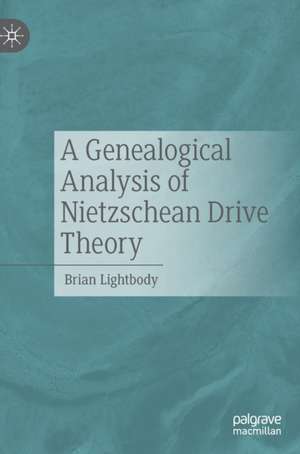A Genealogical Analysis of Nietzschean Drive Theory
Autor Brian Lightbodyen Limba Engleză Hardback – 22 apr 2023
Yet, there remains a glaring lacuna for all the discussion of drive theory in the scholarship. The secondary literature is delinquent in explaining how animal drives became incorporated to form the human psyche. Nietzsche’s account to elucidate how drives became “digested” or in his words “inpsychated” is called the Internalization Hypothesis. However, as it appears in GM:II, 16, the hypothesis is grossly inchoate. The result of this undertheorization is manifold; its deleterious effects resonate along many axes of Nietzsche’s philosophy.
The present book, Internalized Valuation: A Genealogical Analysis of Nietzschean Drive Theory, offers an original and fruitful interpretation of Nietzsche’s philosophical psychology. First, it clarifies what drives are. Second, it provides a new way of thinking about Nietzsche’s genealogical methods and then applies these insights to The Genealogy itself. What follows is a work that not only sheds much-needed light on Nietzsche’s philosophy of mind in general and his theory of emotions in particular, but also informs and illuminates problematic passages of Nietzsche’s Genealogy.
Preț: 728.08 lei
Preț vechi: 887.90 lei
-18% Nou
Puncte Express: 1092
Preț estimativ în valută:
139.32€ • 151.94$ • 117.48£
139.32€ • 151.94$ • 117.48£
Carte tipărită la comandă
Livrare economică 24 aprilie-08 mai
Preluare comenzi: 021 569.72.76
Specificații
ISBN-13: 9783031271472
ISBN-10: 3031271475
Pagini: 240
Ilustrații: X, 240 p.
Dimensiuni: 148 x 210 mm
Greutate: 0.46 kg
Ediția:2023
Editura: Springer International Publishing
Colecția Palgrave Macmillan
Locul publicării:Cham, Switzerland
ISBN-10: 3031271475
Pagini: 240
Ilustrații: X, 240 p.
Dimensiuni: 148 x 210 mm
Greutate: 0.46 kg
Ediția:2023
Editura: Springer International Publishing
Colecția Palgrave Macmillan
Locul publicării:Cham, Switzerland
Cuprins
Chapter 1: Introduction.- Chapter 2: What is Genealogy? A Defense of Implexic Genealogy .- Chapter 3: Drives in the secondary Literature.- Chapter 4: The Internalization Hypothesis: A New Reading.- Chapter 5: A Closer Look at the Internalization of drives as implexes: the cognitive and affective strands.- Chapter 6: A Test Case Comparing Augustinian to Tertullian Christian Subjectivity.- Chapter 7: Conclusion.
Notă biografică
Brian Lightbody is Professor and Chair of Philosophy at Brock University. He is the author of several monographs on Nietzsche’s philosophy, including Nietzsche’s Will to Power Naturalized: Translating the Human into Nature and Nature into the Human and Philosophical Genealogy: An Epistemological Reconstruction of Nietzsche and Foucault’s Genealogical Method Volumes 1 and 2. His work has appeared in such journals as Philosophy Today, The Journal of Ancient Philosophy, and The European Legacy.
Textul de pe ultima copertă
Nietzsche’s “drive theory”, as it is referred to in the secondary literature, is a rich, unique and fascinating articulation of the human condition. In broad brushstrokes, Nietzsche appears to contend that all human psychology is either directly reducible to animal drives (e.g. sex, aggression) or indirectly explicable to the historical transformations thereof (e.g. ressentiment). Moreover, Nietzsche’s initial elucidation of drive theory in On the Genealogy of Morals (and elsewhere) is well-complemented with a fecund, profound, and clear elucidation of the concept in the secondary literature.
Yet, there remains a glaring lacuna for all the discussion of drive theory in the scholarship. The secondary literature is delinquent in explaining how animal drives became incorporated to form the human psyche. Nietzsche’s account to elucidate how drives became “digested” or in his words “inpsychated” is called the Internalization Hypothesis. However, as it appears in GM:II, 16, the hypothesis is grossly inchoate. The result of this undertheorization is manifold; its deleterious effects resonate along many axes of Nietzsche’s philosophy.
The present book, Internalized Valuation: A Genealogical Analysis of Nietzschean Drive Theory, offers an original and fruitful interpretation of Nietzsche’s philosophical psychology. First, it clarifies what drives are. Second, it provides a new way of thinking about Nietzsche’s genealogical methods and then applies these insights to The Genealogy itself. What follows is a work that not only sheds much-needed light on Nietzsche’s philosophy of mind in general and his theory of emotions in particular, but also informs and illuminates problematic passages of Nietzsche’s Genealogy.
Brian Lightbody is Professor and Chair of Philosophy at Brock University. He is the author of several monographs on Nietzsche’s philosophy, including Nietzsche’s Will to Power Naturalized: Translating the Human into Nature and Nature into the Human and Philosophical Genealogy: An Epistemological Reconstruction of Nietzsche and Foucault’s Genealogical Method Volumes 1 and 2. His work has appeared in such journals as Philosophy Today, The Journal of Ancient Philosophy, and The European Legacy.
Yet, there remains a glaring lacuna for all the discussion of drive theory in the scholarship. The secondary literature is delinquent in explaining how animal drives became incorporated to form the human psyche. Nietzsche’s account to elucidate how drives became “digested” or in his words “inpsychated” is called the Internalization Hypothesis. However, as it appears in GM:II, 16, the hypothesis is grossly inchoate. The result of this undertheorization is manifold; its deleterious effects resonate along many axes of Nietzsche’s philosophy.
The present book, Internalized Valuation: A Genealogical Analysis of Nietzschean Drive Theory, offers an original and fruitful interpretation of Nietzsche’s philosophical psychology. First, it clarifies what drives are. Second, it provides a new way of thinking about Nietzsche’s genealogical methods and then applies these insights to The Genealogy itself. What follows is a work that not only sheds much-needed light on Nietzsche’s philosophy of mind in general and his theory of emotions in particular, but also informs and illuminates problematic passages of Nietzsche’s Genealogy.
Brian Lightbody is Professor and Chair of Philosophy at Brock University. He is the author of several monographs on Nietzsche’s philosophy, including Nietzsche’s Will to Power Naturalized: Translating the Human into Nature and Nature into the Human and Philosophical Genealogy: An Epistemological Reconstruction of Nietzsche and Foucault’s Genealogical Method Volumes 1 and 2. His work has appeared in such journals as Philosophy Today, The Journal of Ancient Philosophy, and The European Legacy.
Caracteristici
Offers an original and fruitful interpretation of Nietzsche’s philosophical psychology Clarifies what drives are Suggests a new way of thinking about Nietzsche’s genealogical methods
